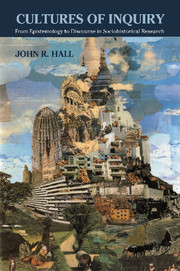Book contents
- Frontmatter
- Contents
- List of tables and figures
- Acknowledgments
- Prologue
- 1 Introduction: the Third Path
- PART I FORMATIVE DISCOURSES
- PART II PRACTICES OF INQUIRY
- 6 Discursive hybrids of practice: an introductory schema
- 7 Generalizing practices of inquiry
- 8 Particularizing practices of inquiry
- 9 The prospects for inquiry
- Notes
- Bibliography
- Index
7 - Generalizing practices of inquiry
Published online by Cambridge University Press: 22 September 2009
- Frontmatter
- Contents
- List of tables and figures
- Acknowledgments
- Prologue
- 1 Introduction: the Third Path
- PART I FORMATIVE DISCOURSES
- PART II PRACTICES OF INQUIRY
- 6 Discursive hybrids of practice: an introductory schema
- 7 Generalizing practices of inquiry
- 8 Particularizing practices of inquiry
- 9 The prospects for inquiry
- Notes
- Bibliography
- Index
Summary
The principal inspirations for generalizing practices of sociohistorical inquiry include Alexis de Tocqueville's comparative studies, the comparative logic of John Stuart Mill, Marxist efforts toward a “scientific” history, Max Weber's comparative historical sociology, and the Annales school's program of structural and social history. These and other sources were brought into historical sociology as it became consolidated in the 1970s. Taking stock at the end of the decade, Theda Skocpol and Margaret Somers argued forcefully against searching for a single methodological solution to establishing better interdisciplinary relations between history and the social sciences. Instead they used substantive exemplars to sketch three broad strategies – the application of a general theory to explain history, the application of concepts to interpret history meaningfully, and the analysis of causal regularities. Their account raises two questions about whether generalizing practices of inquiry can be adequately described by the typology that I introduced in the previous chapter. First, is each of Skocpol and Somers 's three alternative strategies a coherent practice of inquiry that can be described as a distinctive articulation among the four forms of discourse – on values, narrative, social theory, and explanation and interpretation? Second, is it possible to identify a fourth coherent generalizing practice, as we would expect if each of the four formative discourses is capable of structuring a distinctive practice of inquiry by defining a meaningful pattern of ordered relationships among all four formative discourses?
Information
- Type
- Chapter
- Information
- Cultures of InquiryFrom Epistemology to Discourse in Sociohistorical Research, pp. 180 - 203Publisher: Cambridge University PressPrint publication year: 1999
